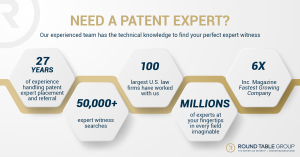Trends Impacting Patent Law in 2022

Continued uncertainty in supply chains and the attempts of regulators to catch up to innovation lead many spectators to believe that patent disputes will continue to thrive in the coming year.
As patent owners and their legal teams look to what 2022 has in store, the following three areas warrant watching this year:
Subject Matter Eligibility
A landmark decision made during the Alice v. Mayo case in 2014 altered the Supreme Court’s position on petitions aiming to clarify § 101 jurisprudence. Several recent decisions made by the Supreme Court on Section 101 have shifted the perspective of what is patent-eligible. As a result, there has been much uncertainty on previously issued patents, some of which have been relied upon for investment and development decisions.
In December of 2021, Yu v Apple Inc was brought before the Supreme Court, attempting to overturn the ruling on 35 U.S.C. § 101 issued by the Federal Circuit US Court of Appeals. The plaintiff in this case petitioned for certiorari, after accusing Apple of infringing on improved zoom and portrait mode technology used in certain dual-lens smart phones.
The activity and uncertainty surrounding § 101 has again garnered the attention of the US Congress, with many looking to the Supreme Court to address the issue. Despite the Supreme Court’s lack of action on the issue, President Biden’s nominee for United States Patent and Trademark Office (USPTO) director, Kathi Vidal, has confirmed her commitment to addressing patent eligibility by focusing on “strengthening the value of IP” because “the law is not set.”
Standard Essential Patent (SEP) Licensing
In 2021 the US witnessed an influx of SEP-related disputes, a trend that will likely continue alongside the growth and application of 5G technologies. There have already been 30,000 patent families deemed “essential” to 5G—not a major surprise given the standardized nature of the industry.
SEPs are especially robust patents, as they are essential to mandatory industry standards, placing them at the disposal of unique licensing rules. These patents are commonplace within highly standardized industries such as telecommunications, because of the necessary interoperability requirements between connected devices.
Antitrust can be utilized to prevent SEP holders from exploiting their dominant market position. However, increasing levels of uncertainty have surrounded antitrust enforcement, and whether the US will pursue practices seen in Asia-Pacific and Europe. Despite this uncertainty, many SEP owners and implementers remain somewhat optimistic that licensing issues are clarified in the coming year.
A draft policy statement was issued by the US Patent and Trademark Office and the US Department of Justice, acknowledging solutions available to patent owners who are open to licensing. The fact that comments have been requested on this draft policy suggest SEP policy arguments will persist throughout the year.
Patent Case Venue Challenges
Patent infringement cases have absolutely exploded in the Western District of Texas, accounting for 25% of all new US suits in 2021. Even more astonishing is that a single judge, Judge Alan Albright, presided over 23% of all patent suits.
This concentration of cases in a single district captured the attention of Supreme Court Chief Justice John Roberts, who expressed concerns in his 2021 year-end report. Based on this information, Justice Roberts counseled the Judicial Conference of the United States to explore how venues are decided upon for patent cases.
Challenges related to venue do not end there, as a ruling within the US District Court for the Eastern District of Texas on the CA Inc. v. Netflix, Inc. case asserted Netflix’s ownership of servers in the district reinforced the choice of venue. The decision was vacated due to other circumstances; however, the location of servers was not fully addressed. Decisions like these are receiving attention, as other internet companies look for clarity around location of servers and the impact on venue for future litigation.
Round Table Group will continue to provide insight as developments in these areas persist. 2022 undoubtedly will be an active year for patent litigation, and our team is dedicated to helping litigators uncover the most qualified experts for their patent cases.
For more than 25 years, Round Table Group has helped litigators locate, evaluate, and employ the best and most qualified expert witnesses. Round Table Group is a great complement to any litigator’s quest for an expert witness and our search is always free of charge. Contact us at 202-908-4500 for more information or start your expert search now.


